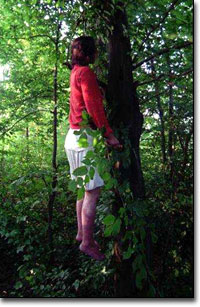


Follow-Up
Related IssueOther Human Rights Stories in Bosnia
A number of other human rights stories were breaking over this period in Bosnia. All sides in the war practiced "ethnic engineering," the process of resettling refugees of one's own ethnic group in the vacated homes of members of the other ethnic group in a given area, thus preventing the latter's return. Serb refugees from other parts of Bosnia and Krajina, with the help of local Serb authorities, forced non-Serb families to leave their homes. And, according to United Nations High Commissioner for Refugees reports, some distraught survivors of the Srebrenica massacre, upon reaching safety in the Tuzla area, forcibly expelled 160 Serb families from their homes and killed four Serb civilians.
Resettlement was a conscious policy often supported by high-ranking politicians on all sides of the war. They excused the policy by saying that people fleeing the war were in fact voluntarily abandoning their property. One Bosnian woman returning to her home in Vrnograc told UN officials that the mayor had moved into her house and had refused to leave. Mass killings were another way to help vacate homes for the use of one's own ethnic group. Killings of non-Serbs as part of ethnic cleansing took place in Banja Luka, Prijedor, Bosanski Novi, and Bosanska Dubica in September and October 1995. This was in part to make room for Serb refugees who were fleeing from Croatian reoccupation of Krajina. Croats reportedly were particular targets for revenge. Many of the civilians who fled or were expelled from the Banja Luka area in September and October reported being robbed, beaten, raped, threatened and forced to walk across minefields, or to cross rivers where the older and weaker people drowned. They also told of paying money to keep men from being taken for forced labor at the front lines. Many were taken despite the payments. According to one Muslim from Banja Luka who was forced to work on the front lines, Serbs forced some laborers to sleep in the trenches during the winter and would sometimes freeze to death overnight.

In Potocari on July 12, a 14-year- old Bosnian girl hung herself after Serb soldiers raped her and her 12-year-old cousin. Photo: AP
While the men were victims of forced labor, women were often the victims of rape and other physical abuse. Amnesty International received reports of suicides by non-Serb women who were traumatized by the brutality they experienced. In Potocari on July 12, a 14-year- old Bosnian girl hung herself after Serb soldiers raped her and her 12-year-old cousin. Bosnian Serbs were not only guilty of "ethnic engineering," but also of "religious engineering." In the Banja Luka area, they forced Muslims to wear white armbands and they painted Muslim houses with white stripes. Serb soldiers also sometimes used knives to cut crosses into the heads of Croats. They also systematically demolished religious sites. According to Amnesty International, Serbs destroyed 1,424 Muslim, 275 Catholic, 30 Orthodox and six Jewish religious sites.
Civilians were the real losers of this war. They were subjected to indiscriminate bombings and shellings, and although it is illegal for military police to arrest civilians, both Federation forces and Republika Srpska authorities routinely seized civilians for use in exchanges for POWs or commodities such as fuel, food, and alcohol. Many sick and wounded captives died because they were denied access to medical treatment.
For more information, see current and archival reports on Bosnia from the U.S. State Department, Human Rights Watch, and Amnesty International.